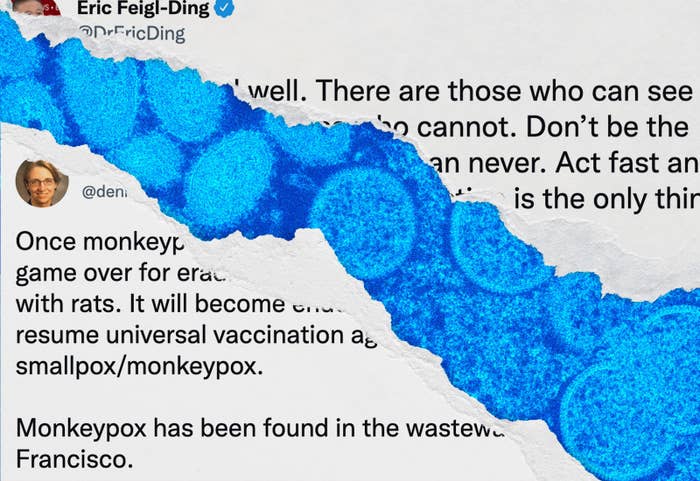
Medical experts are building brands as monkeypox influencers and thought leaders, using their credentials and controversial posts to gain Twitter clout as mounting anxiety over the virus continues to spread.
Denise Dewald, a doctor with over 53,000 followers on Twitter, posted a now-deleted viral tweet claiming that monkeypox was being spread through rats eating infected feces. In order to reduce the spread, she recommended that people should “add bleach to their toilet water and let it sit before flushing.”
“This is simply following the precautionary principle,” Dewald tweeted. “Monkeypox is found in feces. Rodents inhabit the sewers. They eat poop.”
Once monkeypox is detectable in the wastewater, it’s game over for eradication; the sewers are swarming with rats. It will become endemic. We will need to resume universal vaccination against smallpox/monkeypox. Monkeypox has been found in the wastewater in San Francisco.
The tweet caused a divisive outcry among experts on Twitter, with some calling her claim a “bad idea” and others denouncing it as “absolute garbage misinformation.” Monkeypox became a trending associated topic for Google searches involving wastewater.
COVID introduced us to the virus influencer: doctors and science writers on Twitter and Instagram who built huge social profiles — many of which translated into media appearances — by sharing news, information, and takes on an unknown virus during a history-defining pandemic. And now, with monkeypox having been declared a public health emergency, we’re seeing a similar shift, and many sensationalist medical experts have dominated the conversation as people search for answers.
“People find ways to make noise for better or worse, and there is no better time to attract attention than in times of crisis,” said Huge Ma, the brain behind the COVID vaccine locator Twitter account @TurboVax. “It’s nothing other than social media at its core.”
But the balance between helpful medical information and misinformation can be a delicate one.
This week, #MonkeyPoxIsAirborne trended on Twitter after Dana Parish, a health reporter, tweeted screenshots of a now-archived CDC post, claiming that the CDC was lying about the primary mode of transmission being close contact.
“AIRBORNE (respiratory) IS PRIMARY MODE OF TRANSMISSION. Just like COVID,” she wrote.
However, the cause of this particular outbreak is mostly via skin-to-skin contact between men who have sex with men, Emanuela Taioli, the director of epidemiology at Mount Sinai hospitals, told BuzzFeed News, noting that airborne transmission is much rarer. Taioil said that the inaccurate tweets getting spread has caused people to jump to conclusions before things have happened — and the same issue occurred during early COVID.
“It’s a constant battle with misinformation,” she said.
Eric Ding, an epidemiologist who grew a Twitter following of over 720,000 because of his COVID updates, shared a post from a man claiming to have contracted monkeypox via scooter handlebars, ending his tweet with the 👀 emoji. But many criticized the doctor for sharing an unverified story.
So while some are going viral for spreading misinformation, others are just trying to go viral. Benjamin Ryan, a science reporter, gained “4,500 followers in a matter of days,” he said, for writing “men who have sex with me,” instead of “men who have sex with men” in a tweet about monkeypox.
It immediately began circulating as a funny mistake. “⭐️I made it to 10K followers ⭐️All thanks to my poor typing skills!” wrote Ryan in a follow-up tweet, alongside a video of the occasion.
As his audience grew, another follower noted that Ryan had made the same typo a few times in the past, and had replied to another woman’s tweet about her typo, “men who have sex with me,” with “Stealing this.”
Ryan said the chemotherapy treatment he’s been undergoing leaves his brain foggy, and that he’s probably made the mistake lots of times due to years of reporting on gay sex. While he called any suggestion that he’d pretended to do it to help the tweet go viral a “conspiracy theory,” he did acknowledge that he had been looking to grow his followers as a way to promote his reporting.
The thing is, posting about newsy topics as a medical expert does work in building an online brand: Dewald’s followers have jumped by nearly 3,000 people in the last 30 days, according to Social Blade. Eric Ding’s following has increased 40% over the past year, and in turn, he’s begun tweeting more as his audience has steadily risen.
What’s more, sharing relevant, accurate, and practical information on Twitter can be hugely beneficial, since so many people get their news from social media. Ma and his coding skills ensured thousands of New Yorkers got vaccine appointments, and he noted that being in that COVID influencer space — not a term he’d use to describe himself — made him very aware of people spreading misinformation in search of virality.
“On social media it is extremely easy to track engagement through hyperbole and borderline hysteria or misinformation,” he said.
Ma said that he’s unplugged himself from the public health sphere now. “It’s kind of a shitshow,” he said. “When you’re helpful, people are receptive. You will know when you’re doing a good job. It’s not supposed to be controversial.”
To clarify, monkeypox is not transmitted through rats eating your poop, but the dramatic, apocalyptic language used by medical Twitter thought leaders like “game over,” “this will not end well,” “nightmare scenario” and saying that it will be “increasingly possible” for monkeypox to become endemic has caused hysteria over what the hell is going on.
Acey Albert, an internist and director of clinical guidance at Epocrates, an app that provides medical information, told BuzzFeed News he believes those specific tweets by Dewald were misleading, but they stem from truths that were blown out of proportion.
“Yes, monkeypox virus seems to be sensitive to common household disinfectants such as bleach, but the method of spread for this particular outbreak is close contact,” he said.
Albert stressed that monkeypox is not a hugely fatal virus. “What we see here is the unfortunate revival of disinformation — this is being spread on purpose, not due to lack of understanding — on social media for folks who have certain gain,” he said.
When BuzzFeed News reached out to Dewald for an interview, she responded by doubling down on the eating poop aspect. “I suspect that much of the transmission is fecal-oral,” she said via Twitter DM.
She said that the backlash against her has reached a point where she is not sure whether she will continue to stay online. “These sorts of attacks are wearing me down, no matter how asinine they seem,” Dewald wrote, sending a screenshot from a critic calling for her license to be revoked.
Dewald said that she worked at Case Western Reserve School of Medicine; staff at the offices told BuzzFeed News that she was not on their list of providers currently.
Monkeypox is not at all like coronavirus or AIDS in its makeup, but in the age of the pandemic, many people have not known what to trust or believe, Taioli said. Global public attention has been fixated on death and disease for two and a half years, and that has severely impacted the general impression of who is an arbiter of true fact.
“There is a lot of space for prevention,” Taioli said. “But the message has to be straightforward.”
It hasn’t been, however. As people fight to share what they believe is the most important information, the rifts in belief have led the Twitter monkeypox thought leaders down the rabbit hole of internet beef. Ryan said Dewald had blocked him this week. Dewald took a swipe at Ryan on Twitter, calling him a “fool.” Ryan has dunked on Eric Ding. Dewald has given her boy Ding backup. Everyone is fighting.
I’m not sure what Denise Dewald is getting at here, but she appears to be wrongly suggesting that there is substantial spread of #monkeypox through means other than sex between men. Evidence strongly suggests that more casual means of transmission are uncommon. https://t.co/JIgEbKMZes
@benryanwriter @FinchTH I am not blocking you because I am enjoying watching you make a fool of yourself.
“I see a lot of battles to really control the narrative,” Ryan said. “Some of these sorts are out to cause hysteria, which is what we saw during COVID, so it makes sense they would want to move onto the latest market. For a certain segment of the population, it’s interesting. It’s almost like they want to maintain a certain level of hysteria.”
